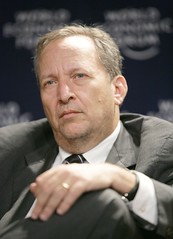 On December 12, 1991, Lawrence Summers, the chief economist for the World Bank, wrote an internal memo that was leaked to the British publication the Economist on February 8, 1992.
On December 12, 1991, Lawrence Summers, the chief economist for the World Bank, wrote an internal memo that was leaked to the British publication the Economist on February 8, 1992.
After the memo became public Jose Lutzenburger, Brazil's Secretary of the Environment back then, wrote to Lawrence Summers:
Shortly after writing his response Jose Lutzenburger was fired. Lawrence Summers, on the other hand, became the U.S. Treasury Secretary on July 2nd, 1999, and served through the remainder of the Clinton Admistration. Afterwards, he was named president of Harvard University.

Recommended Comments
Join the conversation
You can post now and register later. If you have an account, sign in now to post with your account.